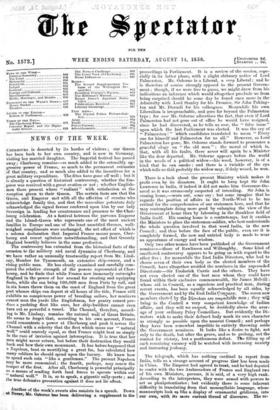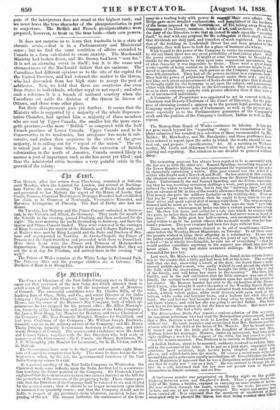NEWS OF THE WEEK.
• Calanounn _is deserted by its hordes of visitors ; our Queen has been back to her own country, and is now in Germany, visiting her married daughter. The Imperial festival has passed away ; Cherbourg remains—so much added to the ostensibly ag- gressive power of France, so much to the permanent estimates of that country, and. so much also added to the incentives for .a great military expenditure. The fetes have gone off well ; but it is already a question of historical controversy, whether the Ern- :-poror was received with a great ovation or not ; whether English- . men there present where " radiant " with satisfaction at the - reception given to their Queen. The certain facts aro that the "Queen, and Emperor met with all the affection of cousins who acknowledge family ties, and that the masculine potentate duly • acknowledged the signal favour conferred upon him by our lady Sovereign in lending her countenance an presence to the C'hey- - bourg celebration. At a festival between the parvenu Emperor and. the Island-Queen who represents one of the most' ancient families in Europe and one of the least unsettled thrones, well- - weighed compliments were exchanged, the net effect of which is a solemn .declaration that Imperial France means peace, Cher- bourg' and recent agitators notwithstanding, and that Queenly . England heartily believes in the same profession.
The controversy has extended from the historical facts of the occasion to Ate military aad naval dynamics Of Cherbourg and we have rather an unusually trustworthy report from Mr. Lind- . say, Member for Tynemouth, an extensive ship-owner, and a ' rising public man. He has closely examined and carefully corn- , pared the relative strength of the powers represented at Cher- bourg, and he finds that while France now immensely outweighs England in the power of her arsenal for creating and equipping - fleets, while she can bring 100,000 men from Paris by rail, and in six hours throw them on the coast of England from the, great port 'whence ships can depart at all hours of the tide, France still exhibits no conspicuous power of breeding sailors, her mariners cannot man the yards like Englishmen, her gentry cannot pro- ' -duce a yachting fleet like ours, her ship-builders cannot even tarn out so powerful a vessel. The Channel, thettfore, accord- ing to Mr. Lindsay, remains the natural wall of Great Britain. He seems to forget that, according to his own account, France could concentrate a power at Cherbourg and push it across the • Channel with a celerity that the fleet whioh mans our " natural wall" could scarcely equal, so that France might beat us simply in the race of invasion against interception. It is true that her men might never return, but before their destruction they would hack and hew their own monument. It has before happened that a Napoleon, bent on mortifying a great foe, has calculated how many soldiers he should spend upon the luxury. He knew how • to spend such coin "like a gentleman." The present Napoleon may be more economical ; the fourth, perhaps, may renew the temper of the first. After all, Cherbourg is powerful principally as a means of sending forth land forces to operate within our " natural wall." It is, so to speak, a gigantic sally-porte ; and the true defensive precaution against it does not lie afloat.
Another of the.week s events also consists in a speech. Down ' at Dfnert Mr. Osborne has been delivering a supplement to the proceedings in Parliament. It is a review of the session, espe- cially in its latter phase, with a slight obituary notice of Lord Palmerston. Mr. Osborne is a Liberal, a very Liberal ; and he is therefore of course strongly opposed to the present Govern- ment; though, if we were free to guess, we might draw from his indications an inference which would altogether preclude us from being surprised should he some day be found once more in the Admiralty with Lord Stanley for his Premier, Sir John Peking- ton and Mr. Disraeli for his colleagues. Meanwhile his own Liberalism is irreproachable, and goes far beyond the Palmerston type ; for now Mr. Osborne advertises the fact, that even if Lord Palmerston had not gone out of office he would have resigned, since he had discovered, as he tells us now, the " false issue" upon which the list Parliament was elected. It was the cry of " Palnaerston " ^which candidates translated to mean " Every one for himself and 'Palmerston for us all." However, as Lord Palmerston has gone, Mr. Osborne stands forward to pronounce a graceful elogy on " the old man" ; the moral of which is, that, with all his faults, there never will again be a Minister like the dear departed. Mr. Osborne appears before the world in the weeds of a -political Widow—his weed, however, is of a kind that he can smoke ; and there is a twinkle of the eye which tells us that probably the widow may, if duly wooed, be won.
There is a luck about the present Ministry which makes it profit even by its disasters. It ought to have kept Sir John Lawrence in India, if indeed it did not make him Governor-Ge- neral as it was erroneously suspected of intending. Sir John is coming home,—worn out, some say ; but some imagine that he regards, the position of affairs in the North-West to be too critical for the comprehension of our statesmen here, and that he May contemplate doing more good by enlarging the view of the Gevernment at home than by labouring in the thankless field of India itself. His coming home is a contretemps, but it enables the Ministers to place the statesman-soldier, who best understands the whole question involved in that word India, in the new Council ; and thus before the face of the public, even ere it is completely formed, the new and untried body is made to wear an appearance of energy and wisdom. Only two other names have been published of the Government nominees—those of Rawlinson and Willoughby. Some kind of smothered controversy appears to be going on with regard to the ,other five ; for meanwhile the East India Directors, who had to 'choo'se seven of their own body as the elected members of the Council, have altogether avoided the nominees in tho superseded Directorate—Sir Frederick Currie and the others. They have not even elected one of the best men whom they could have found within their exclusive commonwealth, Sir James Melvill ; whose aid in Council, as a sagacious and practical man, during recent events, has been equally acknowledged by all sides, by the Government and by the East India Norm, The seven new members electe4 by the I/4**ra are respectable men ; they Will bring to the Council a very competent knowledge of Indian affairs, and they will we suspect, be decidedly above the aver- age of your ordinary Privy Councilors. But evidently the Di- rectors wish to make their defunct body mark its own character as strongly as possible upon the nascent Council ; and perhaps they have been somewhat impolitic in entirely throwing aside -the Government nominees. It looks like a desire to fight, not only to the death, but after the grave, and so to prolong, not the contest for victory, but a posthumous defeat. The ffiling up of each remaining vacancy will be watched with increasing anxiety
• and increasing jealousy.
The telegraph, which has nothing cardinal to report from -India, tells us a strange account of progress that has been made in China. The Emperor had agreed to treat; and he had deputed to confer with the two Ambassadors of France and England two of his own Ministers, persons, it is said, of a very high rank. According to the interpreters, they were armed with powers to act as plenipotentiaries ; but evidently there is some inherent difficulty in translating from that monosyllabic language, whose manuscripts look 8Q like a display of ornamental gridirons, into OW own, with its more current thread of discourse, The re-
pnte of the interpreters does not stand at the highest rank, and we must leave the true character of the plenipotentiaries in part to conjecture. The British and French plenipotentiaries were prepared, however, to treat on the true basis—their own powers.
It does not surprise us to learn that Australia is in a state of chronic crisis,—that is in a Parliamentary and Ministerial sense ; but we find the same condition of affairs extended to Canada in a form calculated to create anxiety. The Macdonald Ministry had broken down, and Mr. Brown had been "sent for." It is not an alarming event in itself; but it is the cause and circumstances of the Macdonald failure that are ominous. The Canadians had different opinions as to the site of the capital for the United Province, and had referred the matter to the Queen, who had descended from her high state to accept the post of 1, arbitrator. Now, we hold that there are courtesies due even "from States to individuals, whether royal or not royal ; and after such a reference it is a breach of national courtesy when the Canadians set aside the decision of the Queen in favour of Ottawa, and chose some other place.
But their disagreement goes yet further. It seems that the Minister who is supported by a majority of the whole Represen- tative Chamber, had against him a majority of those members who are sent by Upper Canada, the smaller but the more ener- getic province,—the more " British " as compared with the half French province of Lower Canada. Upper Canada used to be Conservative in its tendencies, but arrogance has made it sub- versive, and rather than acquiesce in the views of the gross majority, it is calling out for " repeal of the union." The cry is raised just at a time when from the extension of British
colonization in the north of when, Canada seemed likely to assume a post of importance such as she has never yet filled ; and thus the ministerial crisis becomes a very painful crisis in the growth of the colony.



























